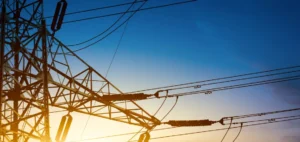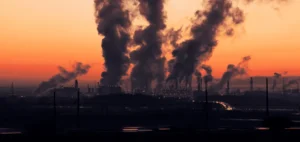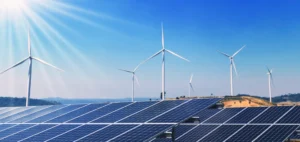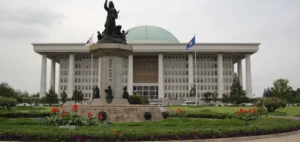The United Arab Emirates’ COP28 presidency will host crucial climate talks. The innovative program was developed following the global listening tour and strategic vision announcement by the COP28 President-designate in July at MoCA.
COP28 UAE announces innovative two-week thematic program
For the first time, the COP28 program will include days dedicated to Health/Relief, Recovery, Peace, as well as Trade and Multilevel Action/Urbanization. The themed program will take place in the Blue and Green Zones. ABU DHABI, United Arab Emirates, Aug. 22, 2023 /CNW/ – The United Arab Emirates’ COP28 presidency has announced an ambitious and inclusive two-week thematic program for the conference, aimed at achieving four key objectives alongside the negotiation process and as part of the critical response to the Global Review.
Taking place at Expo City Dubai from November 30 to December 12, COP28 UAE will focus on accelerating a fair, orderly and equitable energy transition; reforming climate finance; putting nature, lives and livelihoods first in climate action; and mobilizing for the most inclusive COP.
The two-week program aims to stimulate action and put in place political, financial and technological solutions. It was drawn up in consultation with various stakeholders. With civil society, NGOs, young people and indigenous peoples. A six-week open consultation on thematic areas also took place.
COP28 will kick off with a two-day Global Climate Action Summit. The first response to the Global Review will be presented. The COP presidency will be looking for commitments and responsibility. New individual theme days will address global challenges.
COP28: Historic day dedicated to Health, Relief, Recovery and Peace
COP28 will mark a first by devoting a day to Health. It will feature a high-level ministerial on climate health and other thematic activities. COP28 will also be breaking new ground by focusing on the role of trade alongside finance. It will bring together global and local leaders for cleaner cities, for generations to come.
All theme days over the two weeks will focus on an inclusive approach. More detailed information on each theme day will be published in the coming weeks and months.
Inclusive COP28 program: key themes for each day of the conference
Here are the themes for each day: November 30: Opening of COP28 UAE to the world at Expo City, Dubai.
December 1-2: Global Climate Action Summit – These two days will see heads of state and world leaders come together to address the most pressing climate issues in dialogue with leaders from civil society, business, youth, indigenous peoples’ organizations and others. In general, the summit helps to reinforce ambition for the rest of the COP.
For COP28, it will go even further. This is where the Global Review’s first response and the urgency of the situation will be presented. In addition, the COP presidency will be seeking accountability from the highest levels of global governance.
December 3: Health/Relief, Recovery and Peace – Climate change is already having an impact on human health across the planet, from the quality of the air we breathe to the water we drink and the places that provide us with shelter. It is also a major cause of displacement for vulnerable communities, leading to increased fragility that can jeopardize peace.
Recovery Day and resilience: exploring paths of action for greater stability
This day, a first for the UCCs, will explore ways of providing relief to those affected while building resilience and recovery leading to greater stability. December 4: Finance/Trade/Gender Equality/Accountability – Neither the global financial systems that control and impact access and affordability of climate finance, nor the international trade networks, are functioning effectively and equitably. There is a general recognition that the leaders of global institutions and countries must accelerate and take responsibility for overhauling these systems.
One example is freeing up access to international finance. Such as the high interest rates that the poorest countries cannot afford.
COP28: pioneering thematic program for global climate action
Crucial for global equity and vulnerable countries, this day will aim to advance gender equality in climate action.
December 5: Energy and Industry / Just Transition / Indigenous Peoples – The world needs to decarbonize quickly while continuing to make economic progress. It is essential that this development takes place in a sustainable and inclusive way to sustain lives and livelihoods while protecting the planet. This day will focus on how the world can accelerate the energy transition while ensuring it is fair.
Energy must remain affordable but clean, supporting jobs through green technologies. The day will explore a range of solutions, including renewable energy, hydrogen, carbon capture and methane emission reduction.
Multilevel Action and Urbanization: Global and local leaders unite for the climate
It will also focus on high-emission industries such as steel, cement and aluminum. Indigenous peoples are the custodians of 80% of our planet’s biodiversity. Aboriginal Peoples’ Day will recognize the importance of intergenerational knowledge. But also their practices and leadership in climate action. The day will also reinforce their role in just transition, underlining the urgency of a fully inclusive and comprehensive approach.
December 6: Multilevel Action, Urbanization and the Built/Transport Environment – It’s not often that leaders representing all levels of governance, from local to global, get together. The day will provide a rare opportunity for mayors and governors, ministers and parliamentarians, as well as global business and civil society leaders to work together to accelerate climate action solutions in all their forms.
COP28: discover the stakes of biodiversity and oceans in the climate agenda
The day will explore climate-resilient urban mobility systems and promote low-emission infrastructures. It will highlight the ecological transition contributing to safer cities for future generations.
December 7 is a day of rest. December 8 will focus on youth, children, education and skills. As the next generation, children and young people are disproportionately affected by climate change.
The day aims to give children and young people the power to shape the outcome of COP28.
December 9: Nature, Land Use and Oceans – Our world’s climate and biodiversity are inextricably linked, and one cannot exist without the other. World leaders adopted a 30 x 30 biodiversity target at CBD COP15, incorporating mitigation of both crises by protecting 30% of land and water by 2030.
COP28: ecological transition of food, agriculture and water
Contributing to this objective, this day will focus on achieving climate-nature co-benefits. This includes co-designing approaches to land use and ocean conservation with indigenous peoples. This is to protect and manage biodiversity hotspots and natural carbon sinks.
December 10: Food, Agriculture and Water – Climate change is exerting significant pressure and risks on the food, agriculture and water systems that guarantee human well-being. These systems also contribute to climate change. Indeed, agri-food systems emit a third of man-made GHG emissions, and agricultural production uses 70% of the world’s fresh water.
During the day, the focus will be on regenerative agriculture and water-food systems. At the same time, we will encourage collaboration between governments, businesses and farmers to promote more robust and equitable governance.
December 11-12: Final negotiations. The last two days of COP28 will not include theme days to avoid extensive programming.
COP28 UAE: major conference with over 70,000 participants at Expo City Dubai
Notes to Editors COP28 UAE: – COP28 UAE will be held at Expo City Dubai from November 30 to December 12, 2023. The Conference is expected to bring together over 70,000 participants, including heads of state, government officials, international industry leaders, private sector representatives, academics, experts, young people and non-state actors.
– In line with the Paris Climate Agreement, COP28 UAE will present the first-ever Global Review – a comprehensive assessment of progress towards climate goals.
– The UAE will lead a process for all parties to agree a clear roadmap to accelerate progress through a pragmatic global energy transition and a “leave no one behind” approach to inclusive climate action.






















